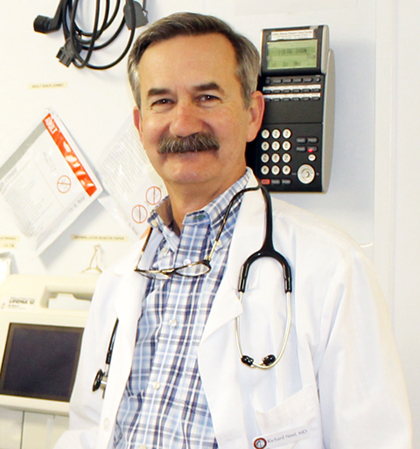Owning two urgent care clinics, Dr. Richard Neel isn’t faced with red tape that many doctors face, and has only one thing on his mind….helping patients and saving lives.
The retired Air Force Colonel/ Chief Flight Surgeon practices medicine with the same kind of courage he flew fighter jet missions many years ago. He is the most passionate doctor I’ve ever met, and he is not afraid to delve into the world of “alternative medicine” when traditional medicine isn’t working.
For that reason he has been able to give dozens of COVID patients an alternative to simply “isolating at home and hoping they don’t start experiencing shortness of breath,” which seems to be the standard recommendation when diagnosed with COVID.

As cases in Texas see in an uptick, Dr. Neel commented in an interview that he has now treated around 50 COVID patients to-date, and they all responded to treatment very quickly, showing significant improvement within 24 hours.
“Everyone that I treated has started feeling better within 24 hours, and none wound up in the hospital or even needing to seek further treatment after taking the recommended dosages,” Dr. Neel said. “The results have just been phenomenal.”
Dr. Neel has studied the anti-toxin and anti-oxidant effects of melatonin for many years. As the pandemic neared, Dr. Neel had a hunch that melatonin could treat COVID too. He began treating patients this past April.
“Many studies proven that melatonin is effective in fighting both bacterial and viral infections,” Dr. Neel said. “With melatonin having such a high safety profile and it working so quickly for COVID patients–there’s just no reason for doctors not to try this.”
Melatonin is a natural chemical that is already in your body and contributes to your immune system. As we grow older, the level of melatonin that we have in our bodies diminishes. It has been shown to be an effective weapon in fighting pneumonias and sepsis, among other things.
Dr. Neel notes that he has now treated several high-risk COVID patients with underlying conditions like heart disease, diabetes and HIV–and the results speak for themselves.
“I am seeing fevers break within 24 hours, body aches go away and sense of smell and taste come back around 48 hours, and it’s taking about 48-72 hours for a severe cough to go away on average,” Dr. Neel notes.
“Many patients had oxygen saturations in the 89-90 range, and they were back up to normal the following day after beginning the treatment,” Dr. Neel stated.
One of those high-risk COVID cases that had great success is a patient in his mid-30’s who suffered from HIV, a dangerous co-morbidity.
“He had high fevers spiking up to 103, severe body aches, shortness of breath, diarrhea, and a very bad cough when he called me. The next morning, he was much better already, and had broken his fever. By the second day the fever and body aches were pretty much gone, and he just kept getting better from there,” Dr. Neel said.
“What I am recommending to other doctors as far as dosages go is 1 mg per kilogram for adults, which is averaging out to around 80-100 mg of melatonin per day for most of my adult patients. Most are able to take it in a single dose at bedtime,” Dr. Neel said. “I want to emphasize that this is NOT A PROFALAXIS DOSE. This is for patients who have severe symptoms, and should be under a doctor’s care.”
“I know there are trials going on in other places, but in the middle of this pandemic, I don ‘t think I could do a true double-blind study, where some patients are given melatonin and some aren’t. I don’t think I could do that to my patients–knowing how fast and well it’s helping people.”
Of the 50 patients who tested positive for COVID, and were treated with melatonin, roughly half of them had symptoms including high fever, body aches, and severe cough, with the other half experiencing mild symptoms or being asymptomatic and staying that way.
“We have definitely seen more cases at our clinics in the last few days than we have in quite in a while,” Dr. Neel said. “It had slowed down quite a bit, and it is definitely picking back up now.”
If you are a patient of Doctor Neel or any MD treating COVID patients with melatonin, please reach out to us on Facebook messenger and share your story with us.
If you or a family member is suffering from COVID, you can contact Dr. Neel at the Little Alsace Urgent Care in Castroville, Texas.
This article is not intended to be a substitute for medical advice. Anyone taking large doses of medication should be under a doctor’s care.

How does it work?
A recent paper title “Therapeutic Algorithm for Use of Melatonin in Patients with COVID-19” asserts that melatonin helps prevent or attenuate the deadly cytokine storm that COVID induces.
“The cytokine storm leads to acute cardiac injury, acute respiratory distress syndrome, and infection, leading to generalized sepsis and multisystem failure, which may lead to death…. Thus, preventing the cytokine storm may be key for the treatment of COVID-19 infected patients. Since there is a lack of effective therapies and immunological treatments may be insufficient, melatonin……may have beneficial effects in preventing or attenuating the cytokine storm and reducing morbidity and mortality from this disease.”
The paper also states, “Melatonin has been shown to be clinically useful in sepsis (43), where the clinical features parallel those of COVID-19 viral infection; moreover, melatonin has been demonstrated to relieve many of the symptoms of other viral infections (17–21, 48).”
Furthermore, the paper states that melatonin can be used in high doses with a very “high safety profile (36, 37).”
The paper referenced at the end of this article was authored by Russel J Reiter., Pedro Abreu-Gonzalez, Paul E Marik., and Alberto Dominguez-Rodriguez.
By Kayleen Holder
THE DEVINE NEWS
Editor
17. Boga JA, Caballero B, Potes Y, Perez-Martinez Z, Reiter RJ, Vega-Naredo I, et al. Therapeutic potential of melatonin related to its role as an autophagy regulator: a review. J Pineal Res. (2019) 66:e12534. doi: 10.1111/jpi.12534
PubMed Abstract|CrossRef Full Text|Google Scholar
18. Anderson G, Maes M, Markus RP, Rodriguez M. Ebola virus: melatonin as a readily available treatment option. J Med Virol. (2015) 87:537–43. doi: 10.1002/jmv.24130
PubMed Abstract|CrossRef Full Text|Google Scholar
19. Paemanee A, Hitakarun A, Roytrakul S, Smith DR. Screening of melatonin, α-tocopherol, folic acid, acetyl-L-carnitine and resveratrol for anti-dengue 2 virus activity. BMC Res Notes. (2018) 11:307. doi: 10.1186/s13104-018-3417-3
PubMed Abstract|CrossRef Full Text|Google Scholar
20. Crespo I, Miguel BS, Laliena A, Alvarez M, Culebras JM, González-Gallego J, et al. Melatonin prevents the decreased activity of antioxidant enzymes and activates nuclear erythroid 2-related factor 2 signaling in an animal model of fulminant hepatic failure of viral origin. J Pineal Res. (2010) 49:193–200. doi: 10.1111/j.1600-079X.2010.00787.x
PubMed Abstract|CrossRef Full Text|Google Scholar
21. Valero N, Mosquera J, Alcocer S, Bonilla E, Salazar J, Álvarez-Mon M. Melatonin, minocycline and ascorbic acid reduce oxidative stress and viral titers and increase survival rate in experimental Venezuelan equine encephalitis. Brain Res. (2015) 1622:368–76. doi: 10.1016/j.brainres.2015.06.034
PubMed Abstract|CrossRef Full Text|Google Scholar
36. Dominguez-Rodriguez A, Abreu-Gonzalez P, de la Torre-Hernandez JM, Consuegra-Sanchez L, Piccolo R, Gonzalez-Gonzalez J, et al. Usefulness of early treatment with melatonin to reduce infarct size in patients with ST-segment elevation myocardial infarction receiving percutaneous coronary intervention (from the melatonin adjunct in the acute myocardial infarction treated with angioplasty trial). Am J Cardiol. (2017) 120:522–6. doi: 10.1016/S0735-1097(17)34668-5
PubMed Abstract|CrossRef Full Text|Google Scholar
37. Dominguez-Rodriguez A, Abreu-Gonzalez P, de la Torre-Hernandez JM, Gonzalez-Gonzalez J, Garcia-Camarero T, Consuegra-Sanchez L, et al. Effect of intravenous and intracoronary melatonin as an adjunct to primary percutaneous coronary intervention for acute ST-elevation myocardial infarction: results of the melatonin adjunct in the acute myocardial infarction treated with angioplasty trial. J Pineal Res. (2017) 62. doi: 10.1111/jpi.12374
PubMed Abstract|CrossRef Full Text|Google Scholar
43. Colunga Biancatelli RML, Berrill M, Mohammed YH, Marik PE. Melatonin for the treatment of sepsis: the scientific rationale. J Thorac Dis. (2020) 12 (Suppl 1):S54–S65. doi: 10.21037/jtd.2019.12.85
PubMed Abstract|CrossRef Full Text|Google Scholar
48. Zhou Y, Hou Y, Shen J, Huang Y, Martin W, Cheng F. Network-based drug repurposing for novel coronavirus 2019-nCov/SARS-CoV-2. Cell Discov. (2020) 6:14. doi: 10.1038/s41421-020-0153-3
PubMed Abstract|CrossRef Full Text|Google Scholar
10 hospitalized patients treated with melatonin when standard COVID treatments weren’t working
The article details a case study of 10 patients given high doses of melatonin in a hospital in the Phillipines between March and April. The article notes that all 10 patients, who were not showing improvement with standard treatments, were administered high doses of melatonin. Doctors found that the 10 patients made a faster recovery, when compared with other COVID patients at the hospital, and none of the 10 patients receiving the melatonin (hdM) ended up requiring a ventilator.
Even the president of the Philippines, President Rodrigo Duterte, has taken notice of melatonin’s potential to fight COVID, according to one of the authors of this research article, who resides here in South Texas.

Now a clinical trial using high doses of melatonin in COVID patients has been announced in the Phillipines recently and will include hundreds of patients. It’s no wonder, as the research article titled “Melatonin as adjuvant treatment for coronavirus disease 2019 pneumonia patients requiring hospitalization (MAC-19 PRO): a case series” documents exciting news.
The article detailing the case studies states, “In all 10 patients given hdM, clinical stabilization and/or improvement was noted within 4-5 days after initiation of hdM. All hdM patients, including 3 with moderately severe ARDS and 1 with mild ARDS, survived; none required Mechanical Ventilation. The 7 COVID19(+) patients were discharged at an average of 8.6 days after initiation of hdM. The 3 highly probable COVID19 patients on hdM were discharged at an average of 7.3 days after hdM initiation. Average hospital stay of those not given hdM (nonhdM) COVID19(+) patients who were admitted during the same period and recovered was 13 days.”
“To provide perspective, although the groups are not comparable, 12 of the 34 (35.3%) COVID19(+) non-hdM patients admitted during the same period died, 7/34 (20.6%) required MV; while 6 of 15 (40%) non-hdM (-) by RT-PCR but highly probable COVID19 pneumonia patients also died, 4/15 (26.7%) required MV.”
The article goes onto state,” No significant side-effects were noted with hdM except for sleepiness, which was deemed favorable by all patients, most of whom had anxietyand symptom-related sleeping problems previously. HdM may have a beneficial role in patients treated for COVID19 pneumonia, in terms of shorter time to clinical improvement, less need for MV, shorter hospital stay and possibly lower mortality. HdM was well tolerated. This is the first report describing the benefits of hdM in patients being treated for COVID19 pneumonia. Being a commonly available and inexpensive sleep-aid supplement worldwide, melatonin may play a role as adjuvant therapy in the global war against COVID19.”
The patients received hdM “at doses between 36 mg/day to 72 mgs/day per os (p.o.) in 4 divided doses.”
Read the full report at www.melatonin-research.net
SOURCE: Melatonin as adjuvant treatment for coronavirus disease 2019 pneumonia patients requiring hospitalization (MAC-19 PRO): a case series Rafael R. Castillo* 1,2,4, Gino Rei A. Quizon^ 1 , Mario Joselito M. Juco1 , Arthur Dessi E. Roman1 , Donnah G. de Leon1 , Felix Eduardo R. Punzalan1,3, Rafael Bien L. Guingon1 , Dante D. Morales1,5, Dun-Xian Tan6 , Russel J. Reiter7 ; on behalf of the MAC-19 PRO Study Group. Received: April 30, 2020; Accepted: June 3, 2020.
